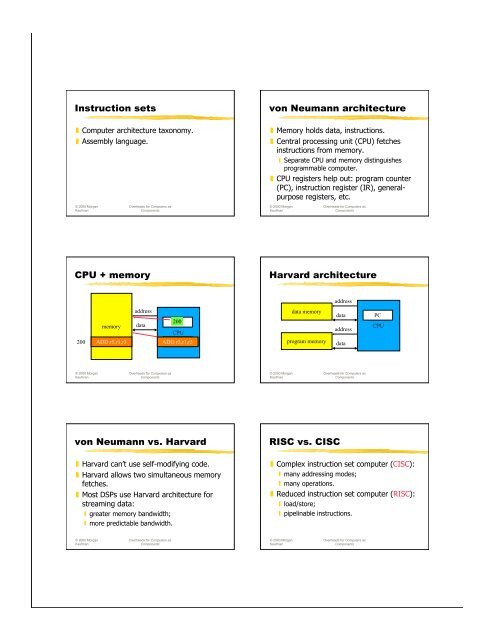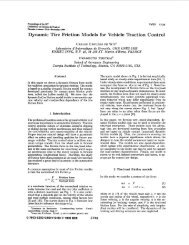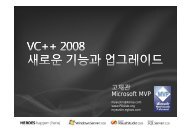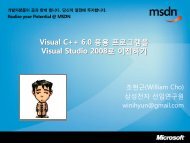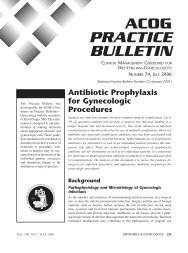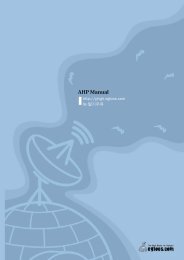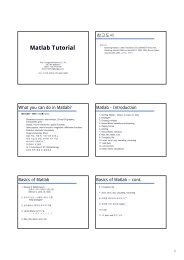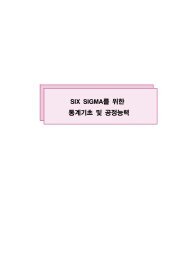Instruction sets von Neumann architecture CPU + memory Harvard ...
Instruction sets von Neumann architecture CPU + memory Harvard ...
Instruction sets von Neumann architecture CPU + memory Harvard ...
You also want an ePaper? Increase the reach of your titles
YUMPU automatically turns print PDFs into web optimized ePapers that Google loves.
<strong>Instruction</strong> <strong>sets</strong><br />
<strong>von</strong> <strong>Neumann</strong> <strong>architecture</strong><br />
Computer <strong>architecture</strong> taxonomy.<br />
Assembly language.<br />
© 2000 Morgan<br />
Kaufman<br />
Overheads for Computers as<br />
Components<br />
Memory holds data, instructions.<br />
Central processing unit (<strong>CPU</strong>) fetches<br />
instructions from <strong>memory</strong>.<br />
Separate <strong>CPU</strong> and <strong>memory</strong> distinguishes<br />
programmable computer.<br />
<strong>CPU</strong> registers help out: program counter<br />
(PC), instruction register (IR), generalpurpose<br />
registers, etc.<br />
© 2000 Morgan<br />
Kaufman<br />
Overheads for Computers as<br />
Components<br />
<strong>CPU</strong> + <strong>memory</strong><br />
<strong>Harvard</strong> <strong>architecture</strong><br />
address<br />
200<br />
<strong>memory</strong><br />
ADD r5,r1,r3<br />
address<br />
data<br />
200 PC<br />
<strong>CPU</strong><br />
ADD IR r5,r1,r3<br />
data <strong>memory</strong><br />
program <strong>memory</strong><br />
data<br />
address<br />
data<br />
PC<br />
<strong>CPU</strong><br />
© 2000 Morgan<br />
Kaufman<br />
Overheads for Computers as<br />
Components<br />
© 2000 Morgan<br />
Kaufman<br />
Overheads for Computers as<br />
Components<br />
<strong>von</strong> <strong>Neumann</strong> vs. <strong>Harvard</strong><br />
<strong>Harvard</strong> can’t use self-modifying code.<br />
<strong>Harvard</strong> allows two simultaneous <strong>memory</strong><br />
fetches.<br />
Most DSPs use <strong>Harvard</strong> <strong>architecture</strong> for<br />
streaming data:<br />
greater <strong>memory</strong> bandwidth;<br />
more predictable bandwidth.<br />
RISC vs. CISC<br />
Complex instruction set computer (CISC):<br />
many addressing modes;<br />
many operations.<br />
Reduced instruction set computer (RISC):<br />
load/store;<br />
pipelinable instructions.<br />
© 2000 Morgan<br />
Kaufman<br />
Overheads for Computers as<br />
Components<br />
© 2000 Morgan<br />
Kaufman<br />
Overheads for Computers as<br />
Components
<strong>Instruction</strong> set<br />
characteristics<br />
Fixed vs. variable length.<br />
Addressing modes.<br />
Number of operands.<br />
Types of operands.<br />
Programming model<br />
Programming model: registers visible to<br />
the programmer.<br />
Some registers are not visible (IR).<br />
© 2000 Morgan<br />
Kaufman<br />
Overheads for Computers as<br />
Components<br />
© 2000 Morgan<br />
Kaufman<br />
Overheads for Computers as<br />
Components<br />
Multiple implementations<br />
Successful <strong>architecture</strong>s have several<br />
implementations:<br />
varying clock speeds;<br />
different bus widths;<br />
different cache sizes;<br />
etc.<br />
Assembly language<br />
One-to-one with instructions (more or<br />
less).<br />
Basic features:<br />
One instruction per line.<br />
Labels provide names for addresses (usually<br />
in first column).<br />
<strong>Instruction</strong>s often start in later columns.<br />
Columns run to end of line.<br />
© 2000 Morgan<br />
Kaufman<br />
Overheads for Computers as<br />
Components<br />
© 2000 Morgan<br />
Kaufman<br />
Overheads for Computers as<br />
Components<br />
Pseudo-ops<br />
Some assembler directives don’t<br />
correspond directly to instructions:<br />
Define current address.<br />
Reserve storage.<br />
Constants.<br />
ARM instruction set<br />
ARM versions.<br />
ARM assembly language.<br />
ARM programming model.<br />
ARM <strong>memory</strong> organization.<br />
ARM data operations.<br />
ARM flow of control.<br />
© 2000 Morgan<br />
Kaufman<br />
Overheads for Computers as<br />
Components<br />
© 2000 Morgan<br />
Kaufman<br />
Overheads for Computers as<br />
Components
ARM versions<br />
ARM assembly language<br />
ARM <strong>architecture</strong> has been extended over<br />
several versions.<br />
We will concentrate on ARM7.<br />
Fairly standard assembly language:<br />
LDR r0,[r8] ; a comment<br />
label ADD r4,r0,r1<br />
© 2000 Morgan<br />
Kaufman<br />
Overheads for Computers as<br />
Components<br />
© 2000 Morgan<br />
Kaufman<br />
Overheads for Computers as<br />
Components<br />
ARM programming model<br />
Endianness<br />
r0<br />
r1<br />
r2<br />
r3<br />
r4<br />
r5<br />
r6<br />
r7<br />
r8<br />
r9<br />
r10<br />
r11<br />
r12<br />
r13<br />
r14<br />
r15 (PC)<br />
31 0<br />
N Z C V<br />
CPSR<br />
Relationship between bit and byte/word<br />
ordering defines endianness:<br />
bit 31 bit 0 bit 31 bit 0<br />
byte 3 byte 2 byte 1 byte 0 byte 0 byte 1 byte 2 byte 3<br />
little-endian<br />
big-endian<br />
© 2000 Morgan<br />
Kaufman<br />
Overheads for Computers as<br />
Components<br />
© 2000 Morgan<br />
Kaufman<br />
Overheads for Computers as<br />
Components<br />
ARM data types<br />
ARM status bits<br />
Word is 32 bits long.<br />
Word can be divided into four 8-bit bytes.<br />
ARM addresses cam be 32 bits long.<br />
Address refers to byte.<br />
Address 4 starts at byte 4.<br />
Can be configured at power-up as either<br />
little- or bit-endian mode.<br />
Every arithmetic, logical, or shifting<br />
operation <strong>sets</strong> CPSR bits:<br />
N (negative), Z (zero), C (carry), V<br />
(overflow).<br />
Examples:<br />
-1 + 1 = 0: NZCV = 0110.<br />
2 31 -1+1 = -2 31 : NZCV = 0101.<br />
© 2000 Morgan<br />
Kaufman<br />
Overheads for Computers as<br />
Components<br />
© 2000 Morgan<br />
Kaufman<br />
Overheads for Computers as<br />
Components
ARM data instructions<br />
ARM data instructions<br />
Basic format:<br />
ADD r0,r1,r2<br />
Computes r1+r2, stores in r0.<br />
Immediate operand:<br />
ADD r0,r1,#2<br />
Computes r1+2, stores in r0.<br />
© 2000 Morgan<br />
Kaufman<br />
Overheads for Computers as<br />
Components<br />
ADD, ADC : add (w.<br />
carry)<br />
SUB, SBC : subtract<br />
(w. carry)<br />
RSB, RSC : reverse<br />
subtract (w. carry)<br />
MUL, MLA : multiply<br />
(and accumulate)<br />
© 2000 Morgan<br />
Kaufman<br />
AND, ORR, EOR<br />
BIC : bit clear<br />
LSL, LSR : logical<br />
shift left/right<br />
ASL, ASR : arithmetic<br />
shift left/right<br />
ROR : rotate right<br />
RRX : rotate right<br />
extended with C<br />
Overheads for Computers as<br />
Components<br />
Data operation varieties<br />
Logical shift:<br />
fills with zeroes.<br />
Arithmetic shift:<br />
fills with ones.<br />
RRX performs 33-bit rotate, including C<br />
bit from CPSR above sign bit.<br />
ARM comparison<br />
instructions<br />
CMP : compare<br />
CMN : negated compare<br />
TST : bit-wise test<br />
TEQ : bit-wise negated test<br />
These instructions set only the NZCV bits<br />
of CPSR.<br />
© 2000 Morgan<br />
Kaufman<br />
Overheads for Computers as<br />
Components<br />
© 2000 Morgan<br />
Kaufman<br />
Overheads for Computers as<br />
Components<br />
ARM move instructions<br />
MOV, MVN : move (negated)<br />
MOV r0, r1 ; <strong>sets</strong> r0 to r1<br />
ARM load/store<br />
instructions<br />
LDR, LDRH, LDRB : load (half-word, byte)<br />
STR, STRH, STRB : store (half-word, byte)<br />
Addressing modes:<br />
register indirect : LDR r0,[r1]<br />
with second register : LDR r0,[r1,-r2]<br />
with constant : LDR r0,[r1,#4]<br />
© 2000 Morgan<br />
Kaufman<br />
Overheads for Computers as<br />
Components<br />
© 2000 Morgan<br />
Kaufman<br />
Overheads for Computers as<br />
Components
ARM ADR pseudo-op<br />
Cannot refer to an address directly in an<br />
instruction.<br />
Generate value by performing arithmetic<br />
on PC.<br />
ADR pseudo-op generates instruction<br />
required to calculate address:<br />
ADR r1,FOO<br />
Example: C assignments<br />
C:<br />
x = (a + b) - c;<br />
Assembler:<br />
ADR r4,a<br />
LDR r0,[r4]<br />
ADR r4,b<br />
LDR r1,[r4]<br />
ADD r3,r0,r1<br />
ADR r4,c<br />
LDR r2,[r4]<br />
; get address for a<br />
; get value of a<br />
; get address for b, reusing r4<br />
; get value of b<br />
; compute a+b<br />
; get address for c<br />
; get value of c<br />
© 2000 Morgan<br />
Kaufman<br />
Overheads for Computers as<br />
Components<br />
© 2000 Morgan<br />
Kaufman<br />
Overheads for Computers as<br />
Components<br />
C assignment, cont’d.<br />
Example: C assignment<br />
SUB r3,r3,r2<br />
ADR r4,x<br />
STR r3,[r4]<br />
; complete computation of x<br />
; get address for x<br />
; store value of x<br />
C:<br />
y = a*(b+c);<br />
Assembler:<br />
ADR r4,b ; get address for b<br />
LDR r0,[r4] ; get value of b<br />
ADR r4,c ; get address for c<br />
LDR r1,[r4] ; get value of c<br />
ADD r2,r0,r1 ; compute partial result<br />
ADR r4,a ; get address for a<br />
LDR r0,[r4] ; get value of a<br />
© 2000 Morgan<br />
Kaufman<br />
Overheads for Computers as<br />
Components<br />
© 2000 Morgan<br />
Kaufman<br />
Overheads for Computers as<br />
Components<br />
C assignment, cont’d.<br />
Example: C assignment<br />
MUL r2,r2,r0 ; compute final value for y<br />
ADR r4,y ; get address for y<br />
STR r2,[r4] ; store y<br />
C:<br />
z = (a
C assignment, cont’d.<br />
Additional addressing<br />
modes<br />
ADR r4,z ; get address for z<br />
STR r1,[r4] ; store value for z<br />
© 2000 Morgan<br />
Kaufman<br />
Overheads for Computers as<br />
Components<br />
Base-plus-offset addressing:<br />
LDR r0,[r1,#16]<br />
Loads from location r1+16<br />
Auto-indexing increments base register:<br />
LDR r0,[r1,#16]!<br />
Post-indexing fetches, then does offset:<br />
LDR r0,[r1],#16<br />
Loads r0 from r1, then adds 16 to r1.<br />
© 2000 Morgan<br />
Kaufman<br />
Overheads for Computers as<br />
Components<br />
ARM flow of control<br />
All operations can be performed<br />
conditionally, testing CPSR:<br />
EQ, NE, CS, CC, MI, PL, VS, VC, HI, LS, GE,<br />
LT, GT, LE<br />
Branch operation:<br />
B #100<br />
Can be performed conditionally.<br />
Example: if statement<br />
C:<br />
if (a < b) { x = 5; y = c + d; } else x = c - d;<br />
Assembler:<br />
; compute and test condition<br />
ADR r4,a ; get address for a<br />
LDR r0,[r4] ; get value of a<br />
ADR r4,b ; get address for b<br />
LDR r1,[r4] ; get value for b<br />
CMP r0,r1 ; compare a < b<br />
BGE fblock ; if a >= b, branch to false block<br />
© 2000 Morgan<br />
Kaufman<br />
Overheads for Computers as<br />
Components<br />
© 2000 Morgan<br />
Kaufman<br />
Overheads for Computers as<br />
Components<br />
If statement, cont’d.<br />
If statement, cont’d.<br />
; true block<br />
MOV r0,#5 ; generate value for x<br />
ADR r4,x ; get address for x<br />
STR r0,[r4] ; store x<br />
ADR r4,c ; get address for c<br />
LDR r0,[r4] ; get value of c<br />
ADR r4,d ; get address for d<br />
LDR r1,[r4] ; get value of d<br />
ADD r0,r0,r1 ; compute y<br />
ADR r4,y ; get address for y<br />
STR r0,[r4] ; store y<br />
B after ; branch around false block<br />
© 2000 Morgan<br />
Overheads for Computers as<br />
Kaufman<br />
Components<br />
; false block<br />
fblock ADR r4,c ; get address for c<br />
LDR r0,[r4] ; get value of c<br />
ADR r4,d ; get address for d<br />
LDR r1,[r4] ; get value for d<br />
SUB r0,r0,r1 ; compute c-d<br />
ADR r4,x ; get address for x<br />
STR r0,[r4] ; store value of x<br />
after ...<br />
© 2000 Morgan<br />
Kaufman<br />
Overheads for Computers as<br />
Components
Example: Conditional<br />
instruction implementation<br />
Conditional instruction<br />
implementation, cont’d.<br />
; true block<br />
MOVLT r0,#5 ; generate value for x<br />
ADRLT r4,x ; get address for x<br />
STRLT r0,[r4] ; store x<br />
ADRLT r4,c ; get address for c<br />
LDRLT r0,[r4] ; get value of c<br />
ADRLT r4,d ; get address for d<br />
LDRLT r1,[r4] ; get value of d<br />
ADDLT r0,r0,r1 ; compute y<br />
ADRLT r4,y ; get address for y<br />
STRLT r0,[r4] ; store y<br />
; false block<br />
ADRGE r4,c ; get address for c<br />
LDRGE r0,[r4] ; get value of c<br />
ADRGE r4,d ; get address for d<br />
LDRGE r1,[r4] ; get value for d<br />
SUBGE r0,r0,r1 ; compute a-b<br />
ADRGE r4,x ; get address for x<br />
STRGE r0,[r4] ; store value of x<br />
© 2000 Morgan<br />
Kaufman<br />
Overheads for Computers as<br />
Components<br />
© 2000 Morgan<br />
Kaufman<br />
Overheads for Computers as<br />
Components<br />
Example: switch<br />
statement<br />
Example: FIR filter<br />
C:<br />
switch (test) { case 0: … break; case 1: … }<br />
Assembler:<br />
ADR r2,test ; get address for test<br />
LDR r0,[r2] ; load value for test<br />
ADR r1,switchtab ; load address for switch table<br />
LDR r1,[r1,r0,LSL #2] ; index switch table<br />
switchtab DCD case0<br />
DCD case1<br />
...<br />
C:<br />
for (i=0, f=0; i
Summary<br />
SHARC instruction set<br />
Load/store <strong>architecture</strong><br />
Most instructions are RISCy, operate in<br />
single cycle.<br />
Some multi-register operations take longer.<br />
All instructions can be executed<br />
conditionally.<br />
SHARC programming model.<br />
SHARC assembly language.<br />
SHARC <strong>memory</strong> organization.<br />
SHARC data operations.<br />
SHARC flow of control.<br />
© 2000 Morgan<br />
Kaufman<br />
Overheads for Computers as<br />
Components<br />
© 2000 Morgan<br />
Kaufman<br />
Overheads for Computers as<br />
Components<br />
SHARC programming<br />
model<br />
Register files:<br />
R0-R15 (aliased as F0-F15 for floating point)<br />
Status registers.<br />
Loop registers.<br />
Data address generator registers.<br />
Interrupt registers.<br />
SHARC assembly language<br />
Algebraic notation terminated by<br />
semicolon:<br />
R1=DM(M0,I0), R2=PM(M8,I8); ! comment<br />
label: R3=R1+R2;<br />
data <strong>memory</strong> access<br />
program <strong>memory</strong> access<br />
© 2000 Morgan<br />
Kaufman<br />
Overheads for Computers as<br />
Components<br />
© 2000 Morgan<br />
Kaufman<br />
Overheads for Computers as<br />
Components<br />
SHARC data types<br />
SHARC micro<strong>architecture</strong><br />
32-bit IEEE single-precision floating-point.<br />
40-bit IEEE extended-precision floatingpoint.<br />
32-bit integers.<br />
Memory organized internally as 32-bit<br />
words.<br />
Modified <strong>Harvard</strong> <strong>architecture</strong>.<br />
Program <strong>memory</strong> can be used to store some<br />
data.<br />
Register file connects to:<br />
multiplier<br />
shifter;<br />
ALU.<br />
© 2000 Morgan<br />
Kaufman<br />
Overheads for Computers as<br />
Components<br />
© 2000 Morgan<br />
Kaufman<br />
Overheads for Computers as<br />
Components
SHARC mode registers<br />
Most important:<br />
ASTAT: arithmetic status.<br />
STKY: sticky.<br />
MODE 1: mode 1.<br />
Rounding and saturation<br />
Floating-point can be:<br />
rounded toward zero;<br />
rounded toward nearest.<br />
ALU supports saturation arithmetic<br />
(ALUSAT bit in MODE1).<br />
Overflow results in max value, not rollover.<br />
© 2000 Morgan<br />
Kaufman<br />
Overheads for Computers as<br />
Components<br />
© 2000 Morgan<br />
Kaufman<br />
Overheads for Computers as<br />
Components<br />
Multiplier<br />
ALU/shifter status flags<br />
Fixed-point operations can accumulate into<br />
local MR registers or be written to<br />
register file. Fixed-point result is 80 bits.<br />
Floating-point results always go to register<br />
file.<br />
Status bits: negative, under/overflow,<br />
invalid, fixed-point undeflow, floatingpoint<br />
unerflow, floating-point invalid.<br />
© 2000 Morgan<br />
Kaufman<br />
Overheads for Computers as<br />
Components<br />
ALU:<br />
zero, overflow, negative, fixed-point carry,<br />
inputsign, floating-point invalid, last op was<br />
floating-point, compare accumulation<br />
registers, floating-point under/oveflow, fixedpoint<br />
overflow, floating-point invalid<br />
Shifter:<br />
zero, overflow, sign<br />
© 2000 Morgan<br />
Kaufman<br />
Overheads for Computers as<br />
Components<br />
Flag operations<br />
Example: data operations<br />
All ALU operations set AZ (zero), AN<br />
(negative), AV (overflow), AC (fixed-point<br />
carry), AI (floating-point invalid) bits in<br />
ASTAT.<br />
STKY is sticky version of some ASTAT bits.<br />
© 2000 Morgan<br />
Kaufman<br />
Overheads for Computers as<br />
Components<br />
Fixed-point -1 + 1 = 0:<br />
AZ = 1, AU = 0, AN = 0, AV = 0, AC = 1, AI<br />
= 0.<br />
STKY bit AOS (fixed point underflow) not set.<br />
Fixed-point -2*3:<br />
MN = 1, MV = 0, MU = 1, MI = 0.<br />
Four STKY bits, none of them set.<br />
LSHIFT 0x7fffffff BY 3: SZ=0,SV=1,SS=0.<br />
© 2000 Morgan<br />
Kaufman<br />
Overheads for Computers as<br />
Components
Multifunction<br />
computations<br />
Can issue some computations in parallel:<br />
dual add-subtract;<br />
fixed-point multiply/accumulate and<br />
add,subtract,average<br />
floating-point multiply and ALU operation<br />
multiplication and dual add/subtract<br />
Multiplier operand from R0-R7, ALU<br />
operand from R8-R15.<br />
SHARC load/store<br />
Load/store <strong>architecture</strong>: no <strong>memory</strong>direct<br />
operations.<br />
Two data address generators (DAGs):<br />
program <strong>memory</strong>;<br />
data <strong>memory</strong>.<br />
Must set up DAG registers to control<br />
loads/stores.<br />
© 2000 Morgan<br />
Kaufman<br />
Overheads for Computers as<br />
Components<br />
© 2000 Morgan<br />
Kaufman<br />
Overheads for Computers as<br />
Components<br />
DAG1 registers<br />
Data address generators<br />
I0<br />
I1<br />
I2<br />
I3<br />
I4<br />
M0<br />
M1<br />
M2<br />
M3<br />
M4<br />
L0<br />
L1<br />
L2<br />
L3<br />
L4<br />
B0<br />
B1<br />
B2<br />
B3<br />
B4<br />
Provide indexed, modulo, bit-reverse<br />
indexing.<br />
MODE1 bits determine whether primary or<br />
alternate registers are active.<br />
I5<br />
M5<br />
L5<br />
B5<br />
I6<br />
M6<br />
L6<br />
B6<br />
I7<br />
M7<br />
L7<br />
B7<br />
© 2000 Morgan<br />
Kaufman<br />
Overheads for Computers as<br />
Components<br />
© 2000 Morgan<br />
Kaufman<br />
Overheads for Computers as<br />
Components<br />
BASIC addressing<br />
Post-modify with update<br />
Immediate value:<br />
R0 = DM(0x20000000);<br />
Direct load:<br />
R0 = DM(_a); ! Loads contents of _a<br />
Direct store:<br />
DM(_a)= R0; ! Stores R0 at _a<br />
I register holds base address.<br />
M register/immediate holds modifier<br />
value.<br />
R0 = DM(I3,M3) ! Load<br />
DM(I2,1) = R1 ! Store<br />
Circular buffer: L register is buffer start<br />
index, B is buffer base address.<br />
© 2000 Morgan<br />
Kaufman<br />
Overheads for Computers as<br />
Components<br />
© 2000 Morgan<br />
Kaufman<br />
Overheads for Computers as<br />
Components
Data in program <strong>memory</strong><br />
Can put data in program <strong>memory</strong> to read<br />
two values per cycle:<br />
F0 = DM(M0,I0), F1 = PM(M8,I9);<br />
Compiler allows programmer to control<br />
which <strong>memory</strong> values are stored in.<br />
Example: C assignments<br />
C:<br />
x = (a + b) - c;<br />
Assembler:<br />
R0 = DM(_a); ! Load a<br />
R1 = DM(_b); ! Load b<br />
R3 = R0 + R1;<br />
R2 = DM(_c); ! Load c<br />
R3 = R3-R2;<br />
DM(_x) = R3; ! Store result in x<br />
© 2000 Morgan<br />
Kaufman<br />
Overheads for Computers as<br />
Components<br />
© 2000 Morgan<br />
Kaufman<br />
Overheads for Computers as<br />
Components<br />
Example, cont’d.<br />
C:<br />
y = a*(b+c);<br />
Assembler:<br />
R1 = DM(_b); ! Load b<br />
R2 = DM(_c); ! Load c<br />
R2 = R1 + R2;<br />
R0 = DM(_a); ! Load a<br />
R2 = R2*R0;<br />
DM(_y) = R2; ! Store result in y<br />
Example, cont’d.<br />
Shorter version using pointers:<br />
! Load b, c<br />
R2=DM(I1,M5), R1=PM(I8,M13);<br />
R0 = R2+R1, R12=DM(I0,M5);<br />
R6 = R12*R0;<br />
DM(I0,M5)=R8; ! Store in y<br />
© 2000 Morgan<br />
Kaufman<br />
Overheads for Computers as<br />
Components<br />
© 2000 Morgan<br />
Kaufman<br />
Overheads for Computers as<br />
Components<br />
Example, cont’d.<br />
SHARC program sequencer<br />
C:<br />
z = (a
Conditional instructions<br />
SHARC jump<br />
<strong>Instruction</strong>s may be executed conditionally.<br />
Conditions come from:<br />
arithmetic status (ASTAT);<br />
mode control 1 (MODE1);<br />
flag inputs;<br />
loop counter.<br />
Unconditional flow of control change:<br />
JUMP foo<br />
Three addressing modes:<br />
direct;<br />
indirect;<br />
PC-relative.<br />
© 2000 Morgan<br />
Kaufman<br />
Overheads for Computers as<br />
Components<br />
© 2000 Morgan<br />
Kaufman<br />
Overheads for Computers as<br />
Components<br />
Branches<br />
Example: C if statement<br />
Types: CALL, JUMP, RTS, RTI.<br />
Can be conditional.<br />
Address can be direct, indirect, PC-relative.<br />
Can be delayed or non-delayed.<br />
JUMP causes automatic loop abort.<br />
C:<br />
if (a < b) { x = 5; y = c + d; }<br />
else x = c - d;<br />
Assembler:<br />
! Test<br />
R0 = DM(_a); R1 = DM(_b);<br />
COMP(R0,R1); ! Compare<br />
IF GE JUMP fblock;<br />
© 2000 Morgan<br />
Kaufman<br />
Overheads for Computers as<br />
Components<br />
© 2000 Morgan<br />
Kaufman<br />
Overheads for Computers as<br />
Components<br />
C if statement, cont’d.<br />
C if statement, cont’d.<br />
! True block<br />
tblock: R0 = 5; ! Get value for x<br />
DM(_x) = R0;<br />
R0 = DM(_c); R1 = DM(_d);<br />
R1 = R0+R1;<br />
DM(_y)=R1;<br />
JUMP other; ! Skip false block<br />
! False block<br />
fblock: R0 = DM(_c);<br />
R1 = DM(_d);<br />
R1 = R0-R1;<br />
DM(_x) = R1;<br />
other: ! Code after if<br />
© 2000 Morgan<br />
Kaufman<br />
Overheads for Computers as<br />
Components<br />
© 2000 Morgan<br />
Kaufman<br />
Overheads for Computers as<br />
Components
Fancy if implementation<br />
Fancy if implementation,<br />
cont’d.<br />
C:<br />
if (a>b) y = c-d; else y = c+d;<br />
Use parallelism to speed it up---compute<br />
both cases, then choose which one to<br />
store.<br />
! Load values<br />
R1=DM(_a); R8=DM(_b);<br />
R2=DM(_c); R4=DM(_d);<br />
! Compute both sum and difference<br />
R12 = r2+r4, r0 = r2-r4;<br />
! Choose which one to save<br />
comp(r8,r1);<br />
if ge r0=r12;<br />
dm(_y) = r0 ! Write to y<br />
© 2000 Morgan<br />
Kaufman<br />
Overheads for Computers as<br />
Components<br />
© 2000 Morgan<br />
Kaufman<br />
Overheads for Computers as<br />
Components<br />
DO UNTIL loops<br />
Example: FIR filter<br />
DO UNTIL instruction provides efficient<br />
looping:<br />
label:<br />
LCNTR=30, DO label UNTIL LCE;<br />
R0=DM(I0,M0), F2=PM(I8,M8);<br />
R1=R0-R15;<br />
F4=F2+F3;<br />
C:<br />
for (i=0, f=0; i
PC stack<br />
PC stack: 30 locations X 24 instructions.<br />
Return addresses for subroutines, interrupt<br />
service routines, loops held in PC stack.<br />
Example: C function<br />
C:<br />
void f1(int a) { f2(a); }<br />
Assembler:<br />
f1: R0=DM(I1,-1); ! Load arg into R0<br />
DM(I1,M1)=R0; ! Push f2’s arg<br />
CALL f2;<br />
MODIFY(I1,-1); ! Pop element<br />
RTS;<br />
© 2000 Morgan<br />
Kaufman<br />
Overheads for Computers as<br />
Components<br />
© 2000 Morgan<br />
Kaufman<br />
Overheads for Computers as<br />
Components


